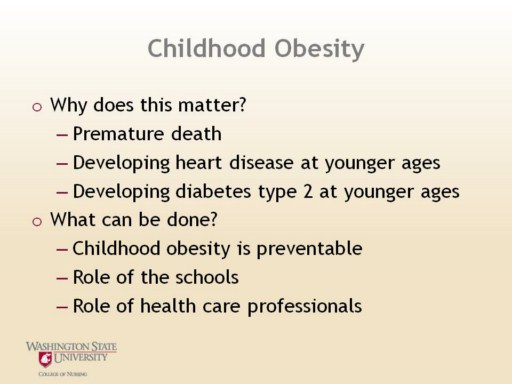| front |1 |2 |3 |4 |5 |6 |7 |8 |9 |10 |11 |12 |13 |14 |15 |16 |17 |18 |19 |20 |21 |22 |23 |24 |25 |26 |27 |28 |29 |30 |review |
 |
“Overweight and obesity, as well as related noncommunicable diseases, are largely preventable. It is recognized that prevention is the most feasible option for curbing the childhood obesity epidemic since current treatment practices are largely aimed at bringing the problem under control rather than effecting a cure. The goal in fighting the childhood obesity epidemic is to achieve an energy balance which can be maintained throughout the individual's life-span.” World Health Organization, Retrieved from http://www.who.int/dietphysicalactivity/childhood_what_can_be_done/en/index.html
When talking about obesity in children, the thought is, “oh there are not that many children..and they will lose their baby fat as they grow up”. This is no longer true. Children are becoming more challenged with being overweight and obese. There are several issues to consider. According to Centers for Disease Control (2010), there are several issues that need to be addressed. The rate of childhood obesity has increased over the past 30 years. The rates of increase are alarming and need to considered carefully. What can we do to help reduce obesity in children? Well, there are many things we can do.
Childhood obesity must be taken into consideration with short and long term issues. These include:
When children are obese or overweight, they are most likely to develop high blood pressure or high cholesterol. According to the Center for Disease Control (2010) children who are overweight or obese were more likely to have more than one risk of heart disease. In a population-based study, children ages 5-17 years, 70% of the kids had at least one risk factor for heart disease. One has to consider, when the body has too much weight, there are more problems with joints, how hard the heart has to work, diabetes, sleep issues with sleep apnea. The issues behind obesity go far beyond the body…but think about self-esteem and being stigmatized. These were also studied and results are clear, obesity is more than being overweight, but it also affects how people and children view themselves and how others view them.
Exercise: When you see someone who is overweight or obese…someone that you do know…what comes to your mind? How do you judge them…what thoughts do you have?
|